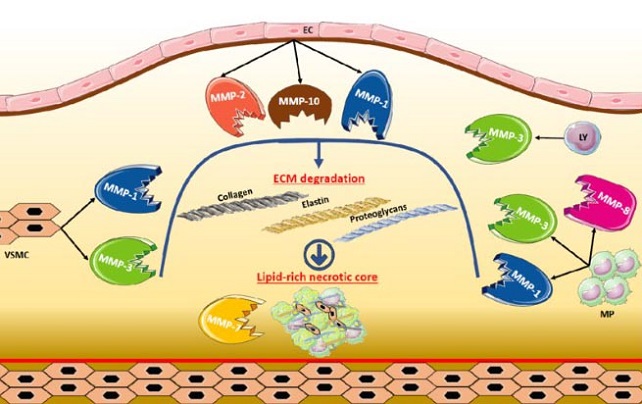Nikhil Prasad Fact checked by:Thailand Medical News Team Aug 27, 2024 1 year, 4 months, 4 days, 16 hours, 16 minutes ago
Medical News: Matrix metalloproteinases (MMPs) are a crucial family of enzymes that play a vital role in maintaining the balance and integrity of tissues in the human body. Researchers from the Department of Medical and Surgical Sciences at Magna Graecia University of Catanzaro in Italy, and the Interuniversity Center of Phlebolymphology (CIFL) at the same institution, have conducted a comprehensive review on the subject. This
Medical News report delves into their findings and expands on the role of MMPs in both health and disease, offering insights that could have significant implications for healthcare systems worldwide.

M
atrix metalloproteinases (MMPs) as regulators of extracellular matrix (ECM) remodeling and plaque vulnerability
Understanding Matrix Metalloproteinases
MMPs are enzymes that are responsible for the breakdown and remodeling of the extracellular matrix (ECM), which is the structural framework that surrounds and supports cells in tissues. The ECM is composed of proteins and other molecules that provide physical support and influence cell behavior. MMPs, along with other related enzymes like ADAMs (a disintegrin and metalloproteinase) and ADAMTS (a disintegrin and metalloproteinase with thrombospondin motifs), are essential for processes such as wound healing, embryogenesis, and bone remodeling.
The activity of MMPs is tightly regulated by tissue inhibitors of metalloproteinases (TIMPs). An imbalance in MMP activity, whether due to overexpression or underexpression, can lead to a variety of diseases, including cancer, cardiovascular disease, and chronic inflammatory conditions. The study highlights the significance of these enzymes and how their regulation is crucial for maintaining health.
MMPs in Health
In healthy tissues, MMPs facilitate the regular turnover and maintenance of the ECM. They are involved in physiological processes like tissue repair, angiogenesis (formation of new blood vessels), and the female reproductive cycle. For instance, during wound healing, MMPs break down damaged ECM components, allowing new tissue to form. Similarly, during embryogenesis, MMPs help in the restructuring of tissues as the embryo develops.
The researchers emphasize that understanding the normal functioning of MMPs is essential for developing therapeutic strategies that can harness their potential in promoting healing and regeneration in various medical conditions.
MMPs in Disease
However, when the balance of MMP activity is disrupted, it can contribute to the development of numerous diseases. For example, in cancer, overactive MMPs can degrade the ECM, enabling cancer cells to invade surrounding tissues and spread to other parts of the body. In cardiovascular diseases, MMPs can weaken the structural integrity of blood vessels, leading to conditions such as aneurysms and atherosclerosis.
The review highlights several studies that illustrate the role of MMPs in disease. One study found a positive correlation between TIMP-1 levels and chest CT scores in patients with COVID-1
9 pneumonia, suggesting that TIMP-1 could be a marker for fibrotic burden in the lungs. Another study demonstrated that MMPs contribute to the calcification of tissues in pseudoxanthoma elasticum, a rare genetic disorder, by dysregulating ECM remodeling.
The Therapeutic Potential of MMPs
Given their central role in both health and disease, MMPs are being explored as potential therapeutic targets. The researchers discuss how regulating MMP activity could offer new treatment options for various conditions. For instance, inhibiting specific MMPs might prevent cancer metastasis, while enhancing MMP activity could improve tissue repair in chronic wounds or after surgery.
The review also explores the potential of MMP inhibitors as a treatment for cardiovascular diseases. By targeting MMPs that degrade the ECM in blood vessels, these inhibitors could help prevent the progression of atherosclerosis and reduce the risk of aneurysms.
Expanding the Research on MMPs
Despite the promising findings, the researchers caution that more studies are needed to fully understand the complex roles of MMPs in different diseases. They suggest that future research should focus on identifying the specific MMPs involved in various pathological processes and developing targeted therapies that can modulate their activity.
The researchers also highlight the importance of studying the interactions between MMPs and other molecules in the ECM. Understanding these interactions could lead to the development of more effective therapies that not only target MMPs but also address the underlying causes of tissue damage and disease progression.
Conclusion
In conclusion, matrix metalloproteinases are key players in maintaining the balance and integrity of tissues in the human body. While they are essential for normal physiological processes, their dysregulation can lead to a wide range of diseases. The research findings underscore the importance of understanding the role of MMPs in health and disease, and how this knowledge can be used to develop new therapeutic strategies.
As the field of MMP research continues to evolve, it holds the promise of unlocking new insights into the mechanisms of disease and improving the diagnosis and treatment of various conditions.
The study findings were published in the peer-reviewed journal: Biomolecules.
https://www.mdpi.com/2218-273X/14/9/1059
For more about Matrix Metalloproteinases, keep on logging to Thailand
Medical News
Read Also:
https://www.thailandmedical.news/news/breaking-news-omicron-sublineages-could-be-using-a-new-viral-invasion-strategy-with-multiple-types-of-matrix-metalloproteinases
https://www.thailandmedical.news/news/sars-cov-2-can-also-use-metalloproteinases,-specifically-mmp-2-and-mmp-9,-for-viral-entry-according-to-recently-published-research
